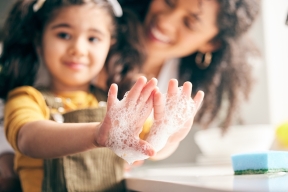Protecting Your Family From Germs
Medically Reviewed by Benjamin B. Elder, MD
McLeod Pediatrician Dr. Benjamin Elder, explains how parents can protect their children from germs by implementing healthy habits and routines.
“There are many different types of germs—tiny living organisms that are too small to see without a microscope,” explains Dr. Elder. “They are in the air, in water, soil, and even in and on the human body. While some germs are harmless and even good for us, others can cause people to get sick.”
Two primary types of germs that can affect you and your family are bacteria and viruses. Some bacteria are good for our bodies. They help keep the digestive system in working order and keep harmful bacteria from moving in. Some bacteria are used to make medicines and vaccines. But bad bacteria can also cause problems like ear infections or strep throat. Antibiotics are used to treat bacterial infections.
Viruses are even smaller than bacteria; they can’t survive unless they’re living inside something else, such as a person, animal, or plant. When they’ve moved into someone’s body, though, viruses spread easily and can make a person sick. Viruses cause common illnesses like colds and the flu and other serious diseases like smallpox. Antibiotics are not effective against viruses.
Germs are transmitted in various ways. When a healthy person touches germs from a sick person, they can become sick as well. For example, your child can become contaminated by touching germs on a desk at school and can then carry the germs home on their hands and spread them to others if they don’t practice proper hand washing.
When an infected person coughs, sneezes, or vomits, droplets are created that carry germs for short distances. These germs can land in a person’s eyes, nose, or mouth and can cause an infection. Those droplets can also land on surfaces like a desk (as mentioned above) and can spread when others touch it.
There are several things you can do to protect yourself and your family from germs. You should always cover your mouth and nose with a tissue or use the inside of your elbow when you cough or sneeze. Also, wash your hands properly, and wash them often. You should scrub them for at least 20 seconds. It’s important to do this throughout the day when you:
- Prepare food
- Before eating food
- Before and after caring for someone who is sick with vomiting or diarrhea
- After using the toilet
- After changing diapers or cleaning up a child who has used the toilet
- After blowing your nose, coughing, or sneezing
- After touching an animal or animal waste
- After touching garbage
Be sure to stay home if you are sick, and make it a habit to clean surfaces throughout your home like door handles, sinks, and countertops with cleaning products designed to kill germs. And if soap and water are not available for handwashing, you can use an alcohol-based hand sanitizer that contains at least 60% alcohol.
To learn more, speak with a pediatrician near you.
-
McLEOD REGIONAL MEDICAL CENTER FLORENCE
843-777-2000 -
McLEOD DARLINGTON
843-777-1100 -
McLEOD DILLON
843-774-4111 -
McLEOD LORIS
843-716-7000 -
McLEOD SEACOAST
843-390-8100 -
McLEOD CHERAW
843-537-7881 -
McLEOD CLARENDON
803-433-3000



-
McLEOD REGIONAL MEDICAL CENTER FLORENCE
843-777-2000 -
McLEOD DARLINGTON
843-777-1100 -
McLEOD DILLON
843-774-4111 -
McLEOD LORIS
843-716-7000 -
McLEOD SEACOAST
843-390-8100 -
McLEOD CHERAW
843-537-7881 -
McLEOD CLARENDON
803-433-3000
 Find a Doctor
Find a Doctor  Locations
Locations  Services
Services 